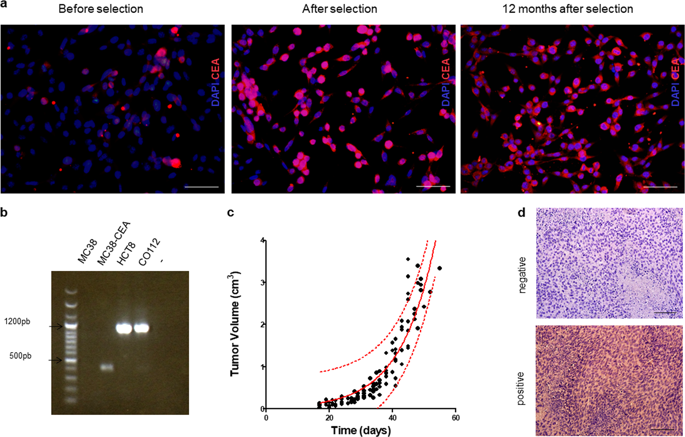当前位置:
X-MOL 学术
›
Gene Ther.
›
论文详情
Our official English website, www.x-mol.net, welcomes your
feedback! (Note: you will need to create a separate account there.)
scFv6.C4 DNA vaccine with fragment C of Tetanus toxin increases protective immunity against CEA-expressing tumor.
Gene Therapy ( IF 4.6 ) Pub Date : 2019-02-15 , DOI: 10.1038/s41434-019-0062-y Bianca Ferrarini Zanetti 1 , Camila Pontes Ferreira 2 , José Ronnie Carvalho de Vasconcelos 2, 3 , Sang Won Han 1, 4
Gene Therapy ( IF 4.6 ) Pub Date : 2019-02-15 , DOI: 10.1038/s41434-019-0062-y Bianca Ferrarini Zanetti 1 , Camila Pontes Ferreira 2 , José Ronnie Carvalho de Vasconcelos 2, 3 , Sang Won Han 1, 4
Affiliation

|
The carcinoembryonic antigen (CEA) is the main tumor-associated antigen of colorectal cancers. Previously, we developed a DNA vaccine using scFv6.C4, a CEA surrogate, against CEA-expressing tumors; 40% of the vaccinated mice were tumor-free after tumor challenge. In order to enhance vaccine efficacy, fragment C of Tetanus Toxin (FrC) was tested as adjuvant. C57BL/6J-CEA2682 mice were electroporated intramuscularly 4 times with uP-PS/scFv6.C4-FrC or uP-PS/scFv6.C4, challenged by s.c. injection of 1 × 105 MC38-CEA cells, and tumor growth was monitored over 100 days. The humoral and cellular immune responses were assessed by ELISA, immunocytochemistry, in-vitro lymphocyte proliferation, and CTL cytotoxicity assays. Immunization with uP-PS/scFv6.C4-FrC or uP-PS/scFv6.C4 induced similar anti-CEA antibody titers. However, immunocytochemistry analysis showed stronger staining with uP-PS/scFv6.C4-FrC-immunized mice sera. When challenged with MC38-CEA cells, 63% of the FrC-vaccinated mice did not develop tumors, half of the rest had a significant tumor growth delay, and the probability of being free of tumors was on average 40% higher than that of scFv6.C4-immunized mice. Addition of the adjuvant led to higher CD4+ and CD8+ proliferative responses and strong CD8+ CTL response against MC38-CEA cells. DNA immunization with scFv6.C4 and FrC increased antitumor effect via induction of high and specific humoral and cellular immune responses to CEA.
中文翻译:

具有破伤风毒素片段C的scFv6.C4 DNA疫苗可增强针对表达CEA的肿瘤的保护性免疫力。
癌胚抗原(CEA)是大肠癌的主要与肿瘤相关的抗原。以前,我们使用scAv6.C4(一种CEA替代品)开发了一种针对表达CEA的肿瘤的DNA疫苗。肿瘤激发后40%的接种小鼠无肿瘤。为了增强疫苗效力,破伤风毒素(FrC)的片段C被用作佐剂。用uP-PS / scFv6.C4-FrC或uP-PS / scFv6.C4将c57BL / 6J-CEA2682小鼠肌肉内电穿孔4次,通过皮下注射1×105 MC38-CEA细胞进行攻击,并监测100多个肿瘤的生长天。通过ELISA,免疫细胞化学,体外淋巴细胞增殖和CTL细胞毒性测定来评估体液和细胞免疫应答。用uP-PS / scFv6.C4-FrC或uP-PS / scFv6.C4免疫诱导了相似的抗CEA抗体效价。然而,免疫细胞化学分析显示,用uP-PS / scFv6.C4-FrC免疫的小鼠血清染色更强。当用MC38-CEA细胞攻击时,接种FrC的小鼠中有63%没有发生肿瘤,其余一半有明显的肿瘤生长延迟,无肿瘤的可能性平均比scFv6高40%。 .C4免疫的小鼠。佐剂的添加导致针对MC38-CEA细胞的较高的CD4 +和CD8 +增殖反应以及较强的CD8 + CTL反应。scFv6.C4和FrC的DNA免疫通过诱导对CEA的高特异性肝细胞和体液免疫应答而增强了抗肿瘤作用。并且没有肿瘤的可能性比经scFv6.C4免疫的小鼠平均高40%。佐剂的添加导致针对MC38-CEA细胞的较高的CD4 +和CD8 +增殖反应以及较强的CD8 + CTL反应。scFv6.C4和FrC的DNA免疫通过诱导对CEA的高特异性肝细胞和体液免疫应答而增强了抗肿瘤作用。并且没有肿瘤的可能性比经scFv6.C4免疫的小鼠平均高40%。佐剂的添加导致针对MC38-CEA细胞的较高的CD4 +和CD8 +增殖反应以及较强的CD8 + CTL反应。scFv6.C4和FrC的DNA免疫通过诱导对CEA的高特异性肝细胞和体液免疫应答而增强了抗肿瘤作用。
更新日期:2019-11-18
中文翻译:

具有破伤风毒素片段C的scFv6.C4 DNA疫苗可增强针对表达CEA的肿瘤的保护性免疫力。
癌胚抗原(CEA)是大肠癌的主要与肿瘤相关的抗原。以前,我们使用scAv6.C4(一种CEA替代品)开发了一种针对表达CEA的肿瘤的DNA疫苗。肿瘤激发后40%的接种小鼠无肿瘤。为了增强疫苗效力,破伤风毒素(FrC)的片段C被用作佐剂。用uP-PS / scFv6.C4-FrC或uP-PS / scFv6.C4将c57BL / 6J-CEA2682小鼠肌肉内电穿孔4次,通过皮下注射1×105 MC38-CEA细胞进行攻击,并监测100多个肿瘤的生长天。通过ELISA,免疫细胞化学,体外淋巴细胞增殖和CTL细胞毒性测定来评估体液和细胞免疫应答。用uP-PS / scFv6.C4-FrC或uP-PS / scFv6.C4免疫诱导了相似的抗CEA抗体效价。然而,免疫细胞化学分析显示,用uP-PS / scFv6.C4-FrC免疫的小鼠血清染色更强。当用MC38-CEA细胞攻击时,接种FrC的小鼠中有63%没有发生肿瘤,其余一半有明显的肿瘤生长延迟,无肿瘤的可能性平均比scFv6高40%。 .C4免疫的小鼠。佐剂的添加导致针对MC38-CEA细胞的较高的CD4 +和CD8 +增殖反应以及较强的CD8 + CTL反应。scFv6.C4和FrC的DNA免疫通过诱导对CEA的高特异性肝细胞和体液免疫应答而增强了抗肿瘤作用。并且没有肿瘤的可能性比经scFv6.C4免疫的小鼠平均高40%。佐剂的添加导致针对MC38-CEA细胞的较高的CD4 +和CD8 +增殖反应以及较强的CD8 + CTL反应。scFv6.C4和FrC的DNA免疫通过诱导对CEA的高特异性肝细胞和体液免疫应答而增强了抗肿瘤作用。并且没有肿瘤的可能性比经scFv6.C4免疫的小鼠平均高40%。佐剂的添加导致针对MC38-CEA细胞的较高的CD4 +和CD8 +增殖反应以及较强的CD8 + CTL反应。scFv6.C4和FrC的DNA免疫通过诱导对CEA的高特异性肝细胞和体液免疫应答而增强了抗肿瘤作用。











































 京公网安备 11010802027423号
京公网安备 11010802027423号